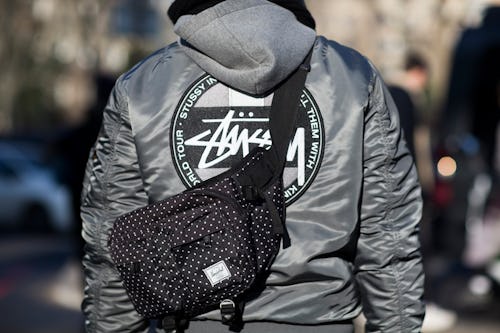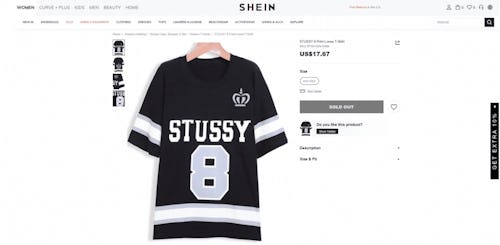
Last year, Chinese retailer Shein overtook H&M, Zara, and Fashion Nova to become the largest fast fashion brand in the U.S.. With a large portion of its wares coming in under $20, the mysterious brand is part of a new wave of ultra-fast fashion that escalates the unsustainable and exploitative model employed by the likes of Zara. Counterfeiting also plays a non-trivial part of its practice, and those who’ve been ripped off are beginning to fight back.
Last week, Stüssy filed a lawsuit against Shein accusing it of trademark infringement, counterfeiting, trademark dilution, and unfair competition. The suit alleges that Shein has sold a number of goods bearing Stüssy’s name and has often avoided using “Stussy” in its listings in an effort to hide its acts of counterfeiting, The Fashion Law reports.
As recourse for the counterfeit sales, Stüssy is asking a California federal court to force Shein to turn over any “earned illegal profits,” as well as pursuing an injunction that would both temporarily prevent the retailer from using its name and symbols.

Stüssy is far from alone —
Shein started garnering attention for its reported $10 billion in revenue for 2020, and last year brands that’ve seen their likenesses pilfered began to file suit. Ralph Lauren and Dr. Martens both began pursuing legal action against the company in 2021, and Shein’s website has also sold counterfeit items copying Gucci, Dior, Bottega Veneta, and more.
Accusations of employing child labor and slavery have also been levied against Shein, and the company has failed to make proper disclosures about its working conditions to the British government as required by law. Despite shady behavior across the board, Shein has proven especially popular among Generation Z and style influencers on TikTok.
In an interview with The Guardian, How to Break Up With Fashion author Lauren Bravo said: “What sets (them apart) from the Zaras and H&Ms of the world was their absolute rock bottom prices. Shein have taken things even further by selling clothes so cheaply that they’re encouraging consumers to see them as disposable.”
In its lawsuit against the company, Stüssy accuses Shein of impairing its “valuable goodwill” and impeding its work to “create an exclusive brand with limited distribution.” Given the brazenness of its practices, don’t be surprised if even more lawsuits follow.







